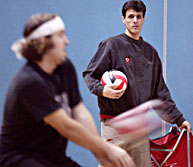McGill's Paralympians
José Rebelo could not help but wonder at watching a man with two prosthetic limbs run 100 m in just over 11 seconds at the 2000 Sydney Paralympics. "Even I was amazed," he says — impressive words from a dedicated athlete who has a prosthetic leg himself. He is well aware that the amazement is momentary, and more lasting is what comes after: the necessary admiration of a dedicated athlete pushing his limits. "He is a person who can run 100 m in 11 seconds," he concludes; "That is what is important."

José Rebelo, Redmen volleyball coach
Andrew Dobrowolskyj
Are disabled athletes different from other athletes? Perhaps that question begs another question: disabled athletes are different, but how important are these differences?
Paralympians certainly don't ignore their disabilities or act as though they didn't exist; the complex classification system that grades and categorizes them according to the severity of their disabilities places their physical differences in a bright, sometimes harsh light. But ultimately, the dazzling variety of their bodies and equipment (prostheses, wheelchairs, etc.) becomes hardly more than an object of momentary curiosity on the way to understanding them as athletes. Take McGill's two Paralympians: Karolina Wisniewska, alpine skier, and José Rebelo, volleyball coach.
Wisniewska asserts that Paralympians are no different from their able-bodied counterparts in terms of attitude or mentality. "We train just as hard as [they do] and we want to win as much as they do." Wisniewska, a McGill graduate (1999), has skied since age six, when a physiotherapist suggested skiing as a form of therapy. cerebral palsy (CP) affects the muscle coordination in her lower body, and skiing challenges her legs and improves her balance. "I do have my own style of skiing that is certainly influenced by my CP," she says, "but I don't use any special equipment and I look able-bodied on skis."
After looking able-bodied on skis for 21 years, she is one of the top disabled skiers in the world, holding the World Cup title for the 2002–2003 season. The title includes the entire season and all events combined, and the fight for it came down to the last run of the last race of the season — in fact, down to eight-tenths of a second. "That's great, suspenseful stuff," she says. Wisniewska earned two silver medals at the Nagano Paralympics in 1998; in Salt Lake City in 2002, she was the most decorated Canadian athlete in the Paralympics or the Olympics with four medals — one for every event she entered. Wisniewska competed the entire time she was at McGill, often taking winter semester off to train out west. Before the Nagano games, she took off an entire year. She appreciates the funding and support from Sport Canada and local centres, but she says of disabled athletes, "We certainly don't get any fame. For instance, who in Canada knows who I am? Who at McGill knew who I was when I was there?"
Perhaps more at McGill know of Rebelo, if only because he has coached the Redmen Volleyball Team for six years, during which time it has been elevated from non-funded status to partially funded status. This is due to the hard work and dedication of its members and its coach. In January 2002, the team rose to the Canadian Interuniversity Sport (CIS) Top 10. Born in Africa but a Montrealer since childhood, Rebelo never knew what it was like to have two real legs, having lost his right leg below the knee at the age of 19 months. His gait is smooth, and it takes an observant eye to locate the carbon fibre clockwork of his prosthesis, hidden by flesh-coloured foam.
Rebelo has participated in every sport imaginable, from swimming to soccer, alongside two-legged competitors. "I always competed with everyone," he says. He began playing volleyball in high school and became a member of the Canadian Disabled Volleyball Team in 1996. After failing to qualify for the 1996 Atlanta Games, they got their chance in 2000. In Sydney they claimed a silver medal for Canada, beating favoured Poland but losing to Germany in the final. "They were better prepared," he explains. "They had a strategy and they stuck to their strategy."
Canada sent its first Paralympic Team, consisting of 22 wheelchair athletes, to Tel Aviv, Israel, in 1968, the third Paralympic Games. Since then Canada's participation has mushroomed, with Canada ranking fifth in the medal tally in Sydney and sixth in Salt Lake City. Disabled athletes are carded in the same way as other athletes and receive funding from Sport Canada and local centres.
Rebelo describes the Paralympics and the opening ceremonies with a rush of excitement. After standing outside in the rain for hours, waiting for Team Canada's turn to parade around the stadium with the flag, the lights inside were bright and the crowd was deafening. "It was overwhelming," he declares.
Karolina Wisniewska is currently studying for an MA in Art History at Oxford. She is on injury status this season due to a concussion and is unsure whether she will be able to compete in Turin in 2006. José Rebelo retired from Team Canada in April 2003 and continues to coach the McGill Redmen Volleyball Team.
